Dinner at TWO, But With Which Acquirer?
I continue negotiations with two potential acquirers of ReadWriteWeb: CMP and Ziff Davis Enterprise. One invites me to dinner, but it turns out three's a crowd.
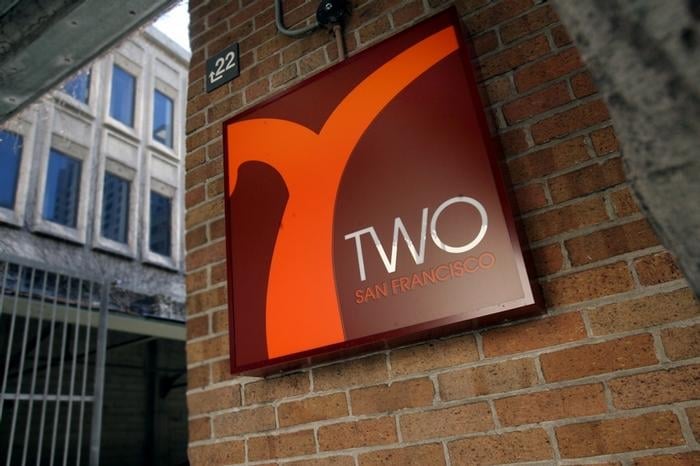
Mike Azzara from Ziff Davis Enterprise had arranged a dinner for three people—he’d be bringing along a new ZDE editor named Stephen Wellman, whom he’d just hired from (of course) CMP. The dinner reservation was at a restaurant called TWO, in the trendy SoMa district of San Francisco, apparently in the original 1922 headquarters of the San Francisco Newspaper Company. Perhaps this was why, as I would soon discover, it was popular with media people.
The reservation was for 6:30 p.m., and I arrived a few minutes early. It was a brick building with a large maroon sign featuring a stylized orange T-shaped logo and the word TWO in white block letters. It was cold outside, so I went straight in. I explained to a waitress at the front desk that I had a reservation with Mike Azzara, but that I was a bit early. She checked the bookings, picked up a menu, and then beckoned me to follow her.
As we walked through the restaurant, my eyes adjusted to the dark brown wood surfaces and the warm golden glow provided by the coconut light fixtures. It felt like a cozy place for a business dinner, but I couldn’t see clearly in the dim light, so I walked rather gingerly past all the tables.
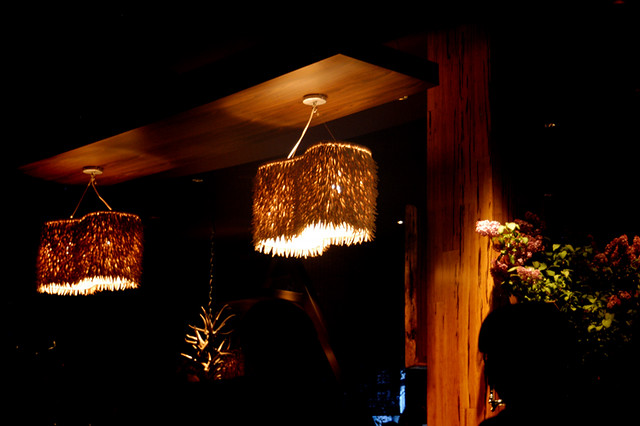
The coconut light fixtures inside TWO; photo taken April 2008 (the same month I was there) by Karen Walrond.
The waitress stopped at a table in the back, which was empty—Mike hadn’t yet arrived. I was trailing several steps behind, so she waited for me to catch up.
Suddenly, I stopped in my tracks a foot or two away from the table. Sitting at one of the adjoining tables were none other than Tony Uphoff and Bob Evans from CMP! There was one other person in their party, but I didn’t recognize them. Tony and Bob hadn’t yet noticed me, so for a brief second, I considered turning around and speed-walking out. However, the waitress had spotted me looking at them. She went over to their table and asked if they were the Mike Azzara party.
I was mortified. There was no way I could escape now, so I reluctantly stepped forward to shake Tony and Bob’s hands. They looked up at me with bemused expressions, wondering what I was doing here. My bright red face felt like a glowing beacon amid the murky lighting. I stammered an apology and turned to the waitress, explaining that this wasn’t who I was meeting. Tony and Bob must’ve realized what was happening and began to smile broadly. Again I apologized, even though this mix-up clearly wasn’t my fault. Grinning, Tony politely said it was no problem and that we’d catch up another time. The waitress led me to the front again.
Shaken, I told the waitress I’d just wait beside the front desk. Then Mike walked in, with Stephen following. Mike was a short, barrel-chested guy with dark hair and beard—he looked a bit like Steve Wozniak. After anxiously shaking hands, I explained to him what had happened. He was taken aback and saw that I was rattled. We’ll find another restaurant, he said, and we made a hasty exit.
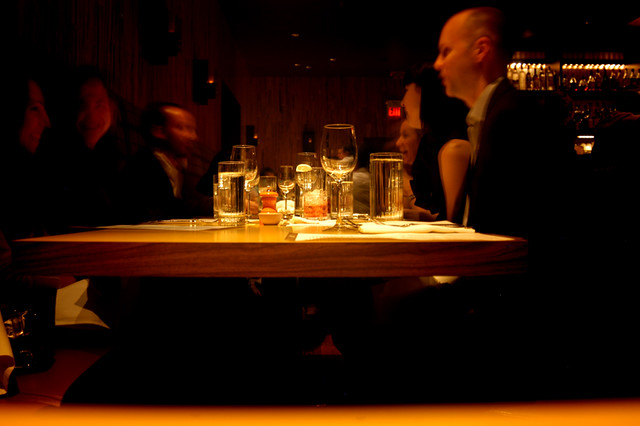
Photo taken inside TWO by Karen Walrond.
I don’t recall what restaurant we went to, but the meal was pleasant enough. Mike was a good talker, and Stephen, a soft-spoken guy a few years younger than me, was friendly and curious about RWW. We talked about what ZDE was trying to do—basically, compete with CMP in the enterprise IT media market—and they also spoke about their experiences working for their prime competitor. (Mike had worked for CMP for nearly twenty years, Stephen for less than three years.)
Despite Mike’s bluster about the prospects of ZDE, I didn’t feel the same connection with him that I’d had with Bob and Fritz during our earlier lunch. He didn’t seem as interested in RWW’s future; the talk was more about what ZDE could turn into, with RWW somehow integrated.
Mind you, I don’t think I fully understood ZDE either, at that point. I kept thinking of ZDNet—my old blogging gig. The confusion was natural, since both ZDE and ZDNet had been spun off from the Ziff Davis media empire. CNET had acquired ZDNet in 2000, and then in 2001 Ziff Davis created a new entity called Ziff Davis Media Inc., which bought back the content licensing rights from ZDNet to eleven publications, including PC Magazine, CIO Insight, and eWeek. In 2007 Ziff Davis Media sold off its B2B publications (including eWeek) to Insight Partners—the company I was actually negotiating with. To make matters even more confusing, Ziff Davis Media had declared bankruptcy the previous month.
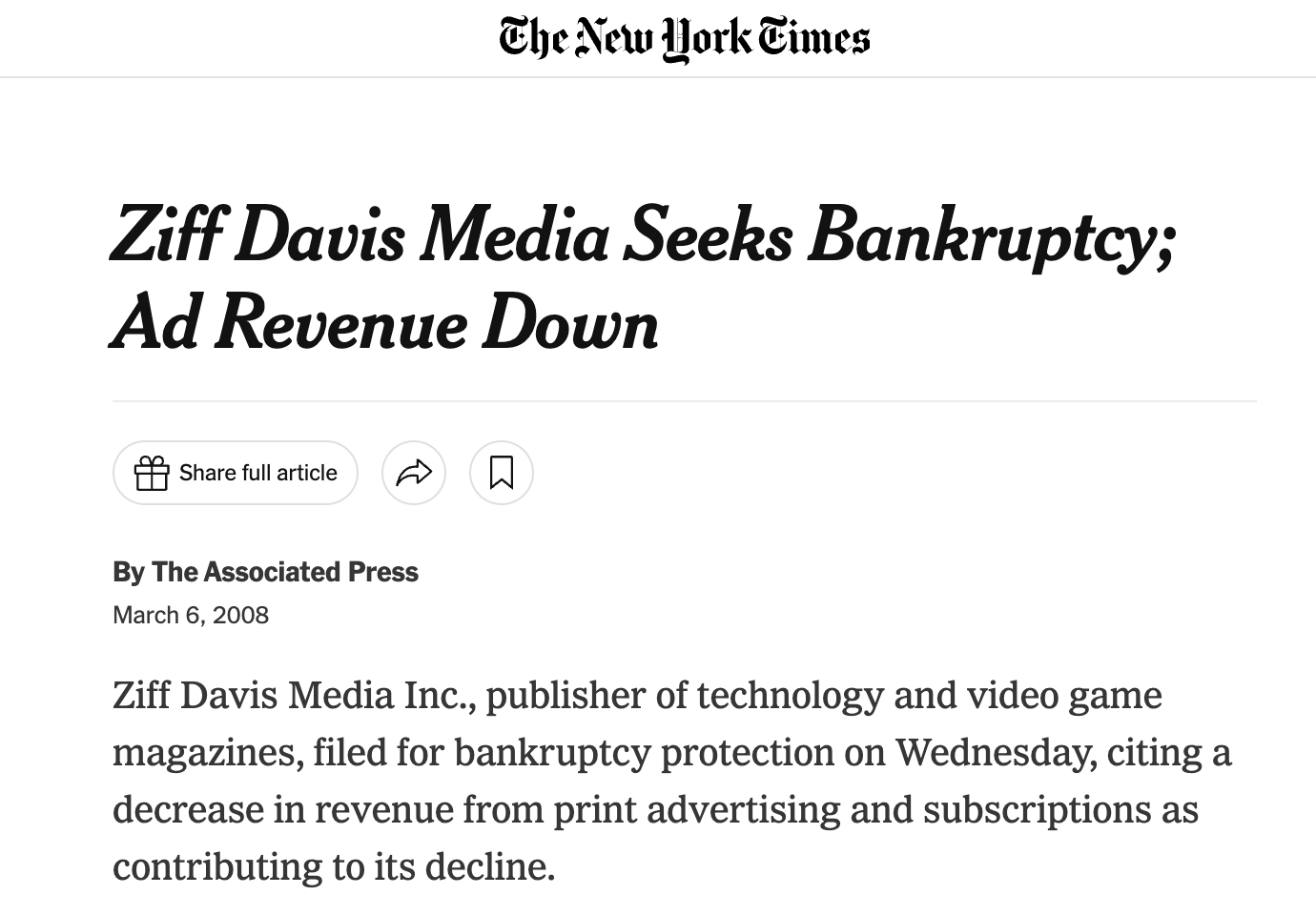
Ziff Davis Media bankruptcy report, NY Times, March 2008. Luckily, this wasn’t the “Ziff Davis” entity I was dealing with.
Despite all these corporate maneuverings, I understood that Ziff Davis Enterprise expected RWW to link up with eWeek, which was known as a fairly bland enterprise IT publication, both paper and online. It had begun in 1984 as a business magazine named PCWeek and was renamed eWeek in 2000, during the era when nearly every new startup was said to be doing e-something.
Part of my reticence with the ZDE offer was my impression that Mike planned to fold RWW into eWeek. My preference was to keep the RWW brand separate. Steve Weitzner, the chairman and CEO of ZDE, had told me their goal was to create a blog network—but he admitted he was unsure whether RWW would “complement or integrate” with eWeek. (Incidentally, he was also an ex-CMP executive and had been Uphoff’s boss before the move to ZDE.)
It seemed likely that if the ZDE deal went through, RWW would be a secondary brand to eWeek. I was much more sure that CMP wanted RWW as a stand-alone brand, since the whole purpose of TechWeb was to be an umbrella network for different media brands. So that was another thing in CMP’s favor as I weighed the two deals.
After dinner I had a conversation with my RWW colleague Sean Ammirati on the phone. He was surprised to hear that I saw Tony and Bob at the restaurant, but he said they probably already knew that ZDE was their competitor for RWW. Sean must’ve sensed how shaken I felt, and he suggested we meet up for a drink to clear my head. I happily agreed.
We met at a bar near my hotel—I don’t recall which one, but it was not the one Bob had invited us to a couple of days ago. I was, by this point, more than a little paranoid. We ordered beers and sat down at a table where I could keep an eye on the rest of the bar.
Sean looked excited to talk with me; I could tell he got a natural buzz from being in the middle of important business deals. His tanned young face couldn’t help smiling, although he also had a look of concern about my anxious state.
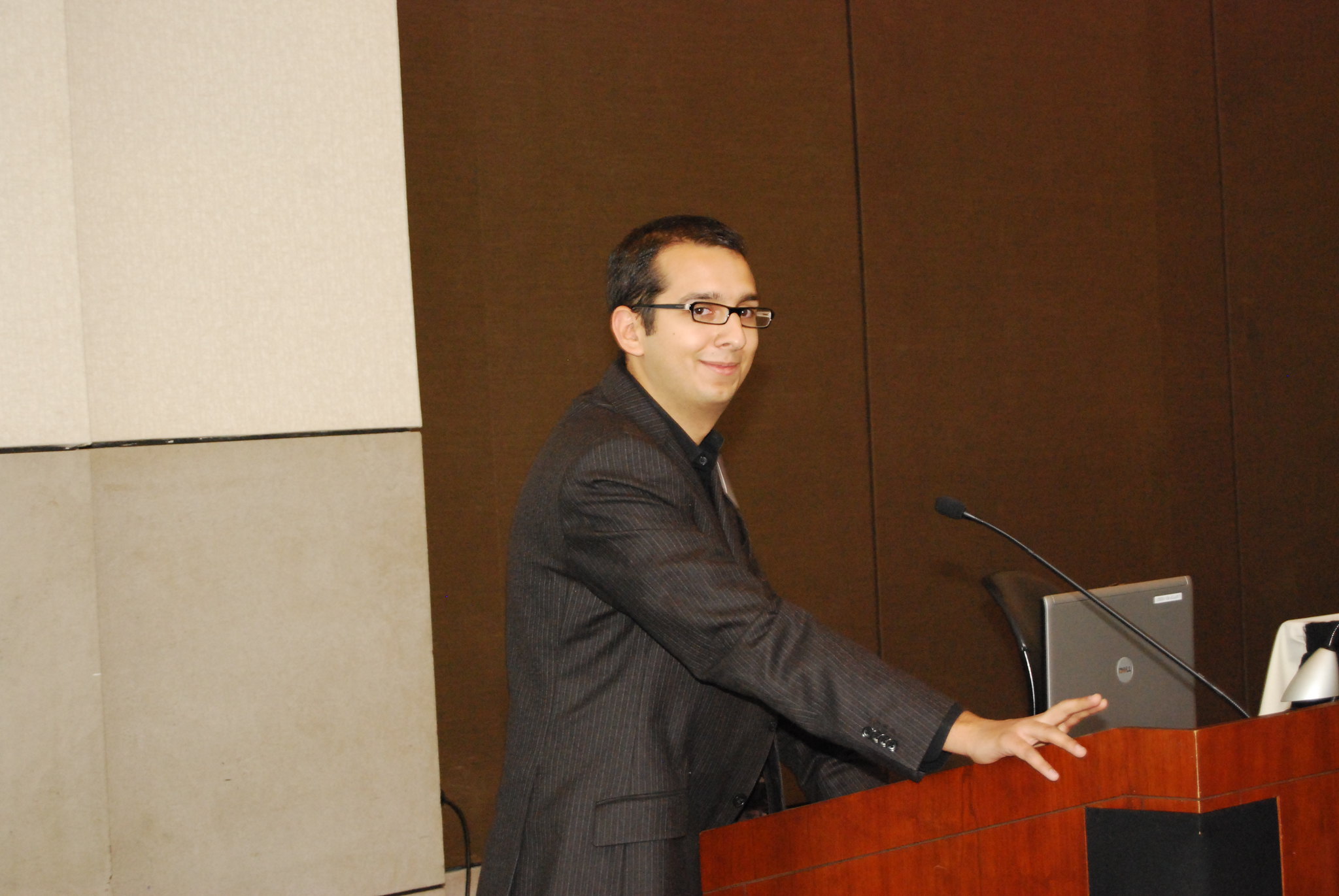
Sean Ammirati a month after our catch-ups in SF. He was writing occasional articles for RWW and running the ReadWriteTalk podcast (all for free — he had his own startup). Photo by Tech.co.
We talked for a bit about the bizarre encounter with CMP. I’d previously learned, perhaps from Bernard, that CMP people have a mischievous sense of humor, so it was possible, I told Sean, that they’d somehow found out I was going to TWO and had told the waitress they were expecting one more person and to send them through. But I knew this was unlikely; I was no doubt projecting my inner discomfort about not knowing what CMP was thinking. Why weren’t they following through on their initial offer? It bugged me that I had even less clarity about CMP now than I’d had a week ago in New Zealand.
Sean had already told me over the last couple of days that he was willing to be a go-between for me and CMP, and he reiterated this as we supped our beers. He could have a private word to Bob in the morning, he said, and tell them they must get an LOI in front of me by first thing Friday morning. Would I like him to do that, he asked?
I demurred and said that perhaps I was being unfair to ZDE in all this. They’d made a decent offer in writing at the start of the week, and yet here I was stalling because of CMP’s antics. Ultimately, I said, I could see past my feelings of unease about ZDE. I wasn’t yet sure how they’d integrate RWW into eWeek (that hadn’t been clarified at dinner), but I knew that whatever happened, RWW would have the organizational support to go to the next level—as my competitors, like TechCrunch and GigaOm, had done with their recent expansions into network blogs, events, and so on. The deal that ZDE had offered was good, I said, and was flexible enough with earn-out that I had a more than fair chance of achieving it.
Sean agreed it was life-changing money that ZDE was offering, especially considering that there was no capital gains tax in New Zealand. But, he asked which would I prefer to have as a partner, money aside?
I admitted that I much preferred CMP as a partner, as they seemed to “get” blogs. Also, I added, the Web 2.0 conference relationships could potentially make me a star player in the industry—maybe I’d even become Tim O’Reilly’s sidekick in future events. Sean smiled and said he knew, from a couple of his sources, that CMP did indeed see me as a key part of the Web 2.0 conferences going forward.
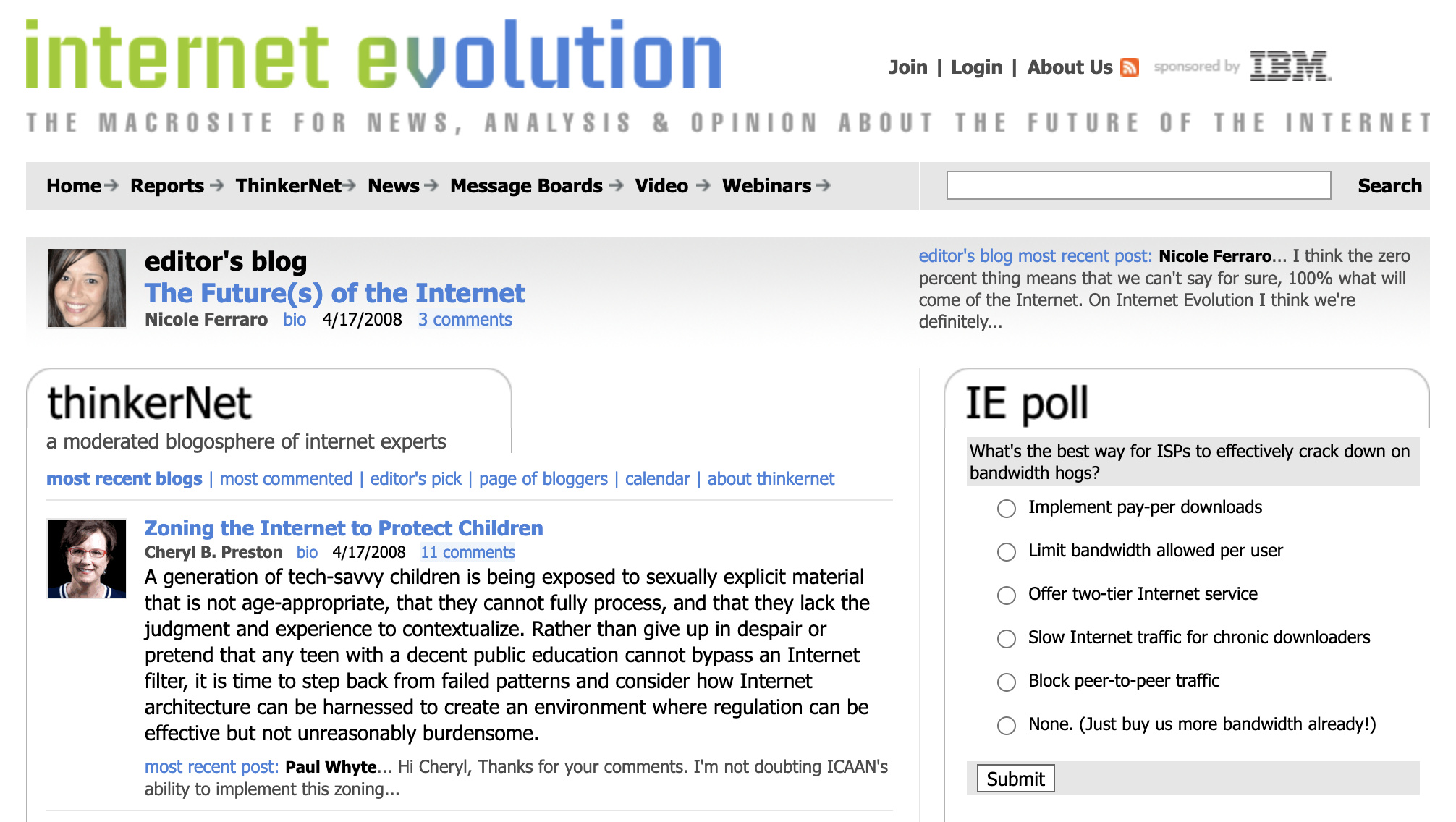
The closest thing CMP had to a Web 2.0 blog was Internet Evolution, which had recently been moved under the TechWeb umbrella as part of UBM’s restructure.
But was that just a pipe dream? The reality of a CMP deal seemed to be slipping away, as I pointed out to Sean. He nodded but said it would be worthwhile to put one more squeeze on them for an offer on paper by Friday. I had noted Bernard’s skepticism about whether Tony and his team even had the ability to set terms for a deal—that the problems stemmed from UBM red tape. But Sean thought that CMP could do a deal quickly if they really had to.
By the end of the night, I’d resolved to send an email to CMP first thing tomorrow, telling them I was going to sign with the other party on Friday morning unless they delivered a firm offer by then. I finished my beer and took a deep breath. Sean grinned and gave me an encouraging slap on the back.
Lead image: TWO Restaurant, SoMA, San Francisco; photo via Yelp.
This post is part of my serialized book, Bubble Blog: From Outsider to Insider in Silicon Valley’s Web 2.0 Revolution. View table of contents.
Next up: 030. A Deal Is Done; Trippy Web 2.0 Party at Temple
You're reading Cybercultural, an internet history newsletter. Subscribe for free, or purchase a premium subscription. Your support for this indie publication would be greatly appreciated.